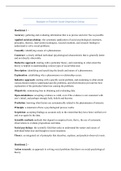Begrippen en Theorieën Sociale Omgeving en Gedrag
Hoofdstuk 1 –
Accuracy: gathering and evaluating information that is as precise and error free as possible.
Applied social psychology: the systematic application of social psychological constructs,
principles, theories, intervention techniques, research methods, and research findings to
understand or solve social problems.
Causality: identifying causes of a phenomenon.
Construct: a clearly defined individual (psychological) characteristic that is generally latent
and not directly observable.
Deductive approach: starting with a particular theory, and examining to what extent the
theory is helpful in understanding various types of social behaviour.
Description: identifying and specifying the details and nature of a phenomenon.
Explanation: establishing why a phenomenon or relationship occurs.
Inductive approach: starting with a specific social problem, and examining to what extent
various theories help to understand specific problems, and which theories provide the best
explanation of the particular behaviour causing the problems.
Objectivity: minimizing bias in obtaining and evaluating data.
Open-mindedness: accepting evidence as valid, even if the evidence is not consistent with
one’s initial, and perhaps strongly held, beliefs and theories.
Prediction: knowing what factors are systematically related to the phenomenon of interests.
Principle: a statement of how a psychological process works.
Scepticism: accepting findings as accurate only to the extent that they have been verified over
and over again by the data.
Scientific methods:methods that depend on empirical tests, that is, the use of systematic
observations to evaluate propositions and ideas.
Social psychology: the scientific field that seeks to understand the nature and causes of
individual behaviour and thought in social situations.
Theory: an integrated set of principles that describes, explains, and predicts observed events.
Hoofdstuk 2 –
Action research: an approach to solving social problems that draws on social-psychological
theory.
,Altruism: a motivation to act in a way that benefits another person.
Applied research: scientific inquiry aimed at solving a specific problem.
Attitude: an individual’s favourable or unfavourable evaluations of a person, object, or idea.
Attribution theory: the tendency to give causal explanations for the behaviour of ourselves
and others.
Basic research: scientific inquiry aimed at developing new knowledge.
Biases: errors in judgement that result from the use of mental short cuts.
Boundary conditions: conditions that distinguish when a theory does or does not apply.
Cognitive dissonance theory: theory that emphasizes the importance of consistency in a
person’s attitudes, beliefs, and behaviours.
Compatibility principle: prescription from the Theory of Planned Behaviour that attitudes,
subjective norms, and perceived behavioural control should be measured at the same level of
specificity.
Compliance: the act of changing behaviour following a direct request.
Conformity: the act of changing behaviour to be consistent with a real or imagined social
expectation.
Construct: a clearly defined individual (psychological) characteristic that is generally latent
and not directly observable.
Contact hypothesis: the theory that bringing members of conflicting groups together will
reduce prejudice and improve intergroup relations.
Deindividuation: the loss of self-awareness and loosening of everyday moral constraints on
behaviour, often brought about by anonymity.
Diffusion of responsibility: principle of helping behaviour that states that as the size of a
group increases, the probability that any single individual will take action to help decreases.
Discrimination: unequal or unfair behaviour towards a person based on group membership.
Dual concern model: a strategic choice model that predicts when a person will yield, choose
inaction, contend, or problem-solve in response to a conflict of interest.
Elaboration likelihood model: a framework that distinguishes between the central and
peripheral routes to persuasion.
Fundamental attribution error: the tendency to overestimate the influence of personality
(i.e., dispositional) variables and underestimate the influence of the situational variables when
explaining other people’s behaviours (and vice versa).
Helping: behaviour that is intended to reduce burden and/or benefit another person.
Heuristic: mental short cuts used to solve problems or make judgements.
Hypothesis: a testable prediction derived from a theory.
, Imitation: the replicating of another’s action.
Ingroup: any group of which you are a member.
Knowledge-deficit model: a theoretical model of behaviour change which posits that social
programmes are underutilized because individuals lack knowledge about the programme or
the behaviour. Psychological research has shown that this model is generally inadequate at
explaining why individuals do not make use of programmes.
Model: a framework that integrates theory and principles. Models typically describe multiple
processes, each linked through some type of causal sequence.
Motivation: a person’s desire and willingness to act in a certain way.
Multiply determined: the notion that an individual’s behaviour is determined by many
psychological and contextual variables, and cannot be completely explained by any single
theory.
Obedience: the act of changing behaviour following an order.
Outgroup: any group of which you are not a member. Perceived behavioural control: a
person’s beliefs about the extent to which the behaviour is achievable by him or herself.
Pluralistic ignorance: the tendency to believe the private attitudes and beliefs of others are
different from one’s own despite identical public behaviour.
Prejudice: unjustified negative attitude towards an individual based on his or her group
membership.
Principle: a statement of how a psychological process works.
Prosocial behaviour: behaving in a manner that benefits another.
Rational choice theory: a broad social science theory for human behaviour that assumes that
individuals are motivated to act in ways that promote their self-interests and choose options
with highest benefits against lowest costs.
Schemas: the cognitive organization of a person’s past experiences, beliefs, and knowledge.
Social cognition: the study of how we process, store, and use information about other people.
Social impact theory: the amount of influence others have in a given situation is a function
of the number of people present, the strength or importance of the people, and the immediacy
(or closeness) of the target person to the influencing agent(s).
Stereotypes: generalized beliefs about a person based on his or her membership of a group.
Subjective norms: construct in the Theory of Planned Behaviour that refers to a person’s
beliefs about what other people who are important to them think they should do.
Theory: an integrated set of principles that describe, explain, and predict observed events.
Theory of Planned Behaviour: explains behaviour engagement resulting from intention,
attitudes, subjective norms, and perceived behavioural control.







